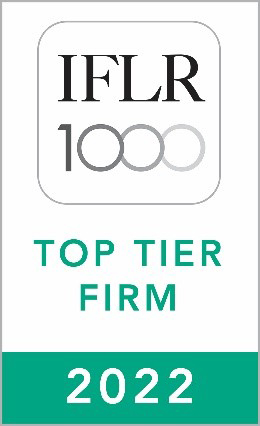News
2023
BBH TOP RANKED IN LEGAL 500
BBH maintained a strong ranking among its competitors in the 2023 edition of The Legal 500 review. Our Dispute Resolution practice was, once again, ranked in the Top Tier 1, while other areas of practice follow suit in Tier 2 - Banking, Finance and Capital Markets, Commercial, Corporate and M&A.
Individually outstanding lawyers include František Honsa, Robert Klenka, Tomáš Politzer, Tomáš Sedláček, Petr Mlejnek, Kateřina Winterling Vorlíčková, Petr Přecechtěl, Zdeněk Husták, Vladimír Uhde, Andrea Adamcová, Matěj Manderla and Petr Vošahlík.
Many thanks to all of our clients for their much appreciated feedback!
Find the complete overview on the website of Legal 500 HERE
2023
BBH AWARDED IN CHAMBERS AND PARTNERS 2023
The 2023 Edition of Chambers and Partners rankings again confirmed the leading role of BBH in key market areas. BBH cemented its position as market leader in Dispute Resolution by being yet again ranked –in Band 1. Furthermore BBH was also successful in other categories, where it remained ranked at the leading positions: Insolvency and Restructuring (Band 2), Mergers & Acquisitions (Band 3) and Banking & Finance (Band 3).
Founding partner František Honsa was ranked as Eminent Practitioner in the Dispute Resolution area for the fourth year running as well as in the Most in Demand Arbitrator category.
Other BBH lawyers recognized in the Chambers and Partners Europe 2023 Individual Ranking were also successful. Vladimír Uhde succeeded in the Dispute Resolution (Band 2) and Dispute Resolution - Arbitration (Band 3) categories, Robert Klenka in Insolvency & Restructuring (Band 2) and Dispute Resolution (Band 4), Petr Přecechtěl in Mergers & Acquisitions (Band 3) and Tomáš Sedláček in Banking & Finance (Band 4) and Capital Markets (Band 3). These lawyers and areas were also evaluated in the Global 2023 category.
2023
BBH INTRODUCES NEW PARTNERS
BBH significantly boosts its ranks of partners. Andrea Adamcová, Matěj Manderla and Petr Vošahlík enter partnership as of 1 January 2023.
„In the past years, we have been able to successfully grow, be it in the financial volume of services or the level of clients. The diligent work of these new partners has been a great contribution to that result. Andrea, Matěj and Petr all started at BBH as student paralegals and their advancement into partnership evidences the personal development that BBH enables. We greatly appreciate that in the recent years all of them have gained the respect of their peers and clients in their relevant areas of our practice: Andrea in M&A and related Financing, Matěj in Restructuring and Contract Law and Petr in Litigation and Arbitration,“ comments BBH Managing Partner, Petr Mlejnek.
Over her more than 15 years of practice, Andrea Adamcová has gained significant experience in banking and financial law, mergers and acquisitions and corporate law and has worked on a number of major financing projects, including the structuring of a number of syndicated, club and bilateral loans, representing leading Czech and foreign companies and institutions, on both the creditor and debtor side, in a number of cases exceeding tens of billions of Czech crowns. Andrea further worked on a number of the most important acquisition transactions that have taken place on the Czech and international markets and the creation of a number of important joint ventures, private equity funds and further cross-border structures for BBH clients.
Andrea graduated from the Faculty of Law of Charles University in Prague and speaks and works in Czech, Slovak and English.
Matěj Manderla has been specializing in Commercial and Civil Law for almost a decade and focuses on contract law, insolvency law, litigation, telecommunications and media law and energy law. Matěj thus provides key legal advisory for investment groups and takes part in the structuring, financing and acquisition of the investments themselves, with a further focus on distressed assets. One case in point, Matěj worked as a telecommunications law expert in representing PPF Group in its acquisition of O2 Telefónica.
Matěj is a graduate of the Faculty of Law of Charles University in Prague and speaks and works in Czech and English.
Petr Vošahlík has been with BBH since 2013, focusing on representing clients in arbitration and court proceedings and is a listed arbitrator with the Arbitration Court attached to the Economic Chamber of the Czech Republic and the Agrarian Chamber of the Czech Republic, the Vienna International Arbitral Center (VIAC) and is a member of the German Arbitration Institute (DIS). Petr has extensive experience in advising clients in international arbitrations under the VIAC, ICC, DIS, LCIA rules before the Arbitration Court of the CCCR and the ACCR and other significant arbitral institutions. In particular, Petr deals with post-M&A disputes and damages claims, including suits for lost profit with an emphasis on the real-estate development, telecommunications and healthcare industries. In addition, Petr also concentrates on the area of Private International Law and handles Criminal Law and defense. Petr was also involved as an external associate of the Faculty of Law of Charles University in Prague, where he participated in teaching arbitration and advocacy skills.
Petr graduated from the Faculty of Law of Charles University in Prague and advises clients in the Czech, English and German languages.
2022
BBH RANKED HIGHLY AMONG THE BEST LAW FIRMS IN THE 2022 EDITION OF IFLR 1000
We are pleased to announce that BBH was once again acknowledged as one of the best law firms on the Czech market in the 2022 IFLR 1000 rankings.
BBH was recognized in the Tier 2 in the following areas of its practice: Banking and Finance, Capital Markets: Debt, M&A and Restructuring/Insolvency and in the Tier 3 in Capital Markets: Equity. Partners Vladimír Uhde, Robert Klenka, Petr Přecechtěl and Zdeněk Husták received the ‘Highly Regarded’ rating in the individual IFLR rankings, Andrea Adamcová and Alice Nytrová received praise as ‘Rising Stars’ and Tomáš Sedláček yet again maintained his unique recognition as ‘Market Leader’.
The complete ranking of BBH in the 2022 edition of IFLR 1000 ranking can be found HERE.

2022
Transfer of a majority business interest
On July 17, 2022, an indirect amendment to the Commercial Code1 will come into effect, which will significantly affect the effects of the transfer of a majority business interest in a limited liability company and the administrative obligations related to the transfer of a business interest.
|
I. Effectiveness of the transfer of the business interest |
|
|
|
By majority business interest we mean a business interest with which at least half of the voting rights in the company are associated.
|
|
|
|
In the case of a minority business interest, according to current legislation, the effects of the transfer of the business interest vis-à-vis the company already occur from the date of delivery of the contract on the transfer of the company's business interest, if they do not occur with the later effect of the contract.
|
|
In the case of a majority business interest, on the other hand, until the amendment came into effect, the effects of its transfer only occur upon entry in the commercial register, and this entry has constitutive effects. This means that the transferee acquires the ownership right to the transferred majority business interest and related property and non-property rights only upon entry in the commercial register.
|
|
|
|
As from July 17, 2022, however, single regime will apply to all transfers of business interests in a limited liability company, namely the one we described above in relation to the transfer of a minority business interest.
|
|
|
|
The effects of the transfer of the business interest (majority or minority) within the meaning of the amendment occur vis-à-vis the company from the date of delivery of the contract for the transfer of the company’s business interest, if they do not occur with the later effect of the contract, but not before the general meeting has given its approval to the transfer of the business interest, if the approval of the general meeting is required by law or by memorandum of association to the transfer of the business interest. |
|
|
|
|
|
II. Administrative burden |
|
|
|
Currently, in order to transfer a majority business interest, it is necessary to provide the commercial register with either the consent of the tax administrator to the transfer (if the transferor or the transferee is listed on the list of tax debtors), or an affidavit of both the transferor and the transferee stating that they are not obliged to enclose the consent of the tax administrator with a certified signature. |
|
|
|
As from July 17, 2022, it will not be necessary to enclose the consent of the tax administrator for any transfer of the business interest in a limited liability company, nor a special affidavit on non-existence of this obligation. This eliminates the administrative burden and fees associated with certifying signatures. |
[1] Act no. 111/2022 on the solution of imminent bankruptcy and on the amendment of certain acts
2022
Selected Aspects of the New Electronic Communications Act
On February 1, 2022, Act no. 452/2021 Coll. on Electronic Communications (hereinafter referred to as the “New AEC”), which incorporates Directive (EU) 2018/1972 of the European Parliament and of the Council establishing a European Code of Electronic Communications into Slovak law.
Among other aspects, the new AEC regulates the rules for processing the so-called cookies and privacy of users in electronic communications, and thus the rules set out in the New AEC affect the practical life of most business entities in the Slovak Republic. In this Memorandum, we will focus on the most fundamental differences in the New AEC compared to the legislation in force until February 1, 2022 (Act No. 351/2011 Coll. on Electronic Communications, hereinafter the "Old AEC") and their practical implications in the company's life.
1. Unsolicited Communication
Definition of the electronic mail has not changed in the New AEC when compared to the previous rules, and thus electronic mail still means a text, voice, audio or image/ video message sent over a public network that can be stored in the network or recipient's terminal equipment until it is picked up by the recipient. It is therefore e-mails, SMS/ MMS messages, so-called push messages, voice messages, etc.
Direct Marketing
When compared to the previous regulation, the New AEC has introduced a definition of direct marketing, which means any form of presentation of goods or services in written or oral form, sent or presented through a publicly available service directly to one or more participants or users (i. e. persons who have concluded a contract with a company providing electronic communications services or a person who uses such services – for example, if the telephone number assigned to the parents is used by a child).
Consent
The new AEC emphasizes and explicitly states the obligation to obtain prior demonstrable consent to direct marketing by strengthening the principle that such consent must be obtained before contacting the recipient.
However, according to the new regulation, the prior consent of the recipient of the electronic mail for the purposes of direct marketing is not required in the case of
- direct marketing of the person's own similar goods and services, if you have obtained contact details in connection with the sale of goods or services in accordance with the law, or
- in the case of direct marketing addressed to the published contact details of a participant or a user who is a natural person – entrepreneur or a legal person.
It follows from the above that the New AEC allows sending of not only the so-called cold mails, but also performance of direct marketing to the published contact details of entrepreneurs and legal persons. However, even in such cases, it will be necessary to comply with the provisions of the New AEC on the possibility of refusing such use of contact data in each case of direct marketing, and to pay attention to the period of use of the contact data obtained in such way.
However, we would like to draw your attention to the opinion of the European Court of Human Rights in the case Amann against Switzerland, according to which both, the GDPR and the ePrivacy Directive, provide protection, regardless of whether it is a private or professional aspect of life. The exception in the New AEC relating to natural persons – entrepreneurs may therefore constitute an invasion of privacy which is not supported by the ePrivacy Directive, the GDPR or the Constitution of the Slovak Republic.
Refusal of Consent
ipient of the electronic mail must be given the opportunity, simply and free of charge, at any time to refuse such use of the contact details at the time of obtaining of such data and by means of each message received, if the recipient has not previously refused such use. We would like to point out that this obligation also applies if you plan to use your customer's contact details for the direct marketing of your own similar goods and services. In practice, this obligation is often overlooked, and non-compliance with the relevant provisions of the law can be severely sanctioned. It is therefore appropriate to carefully consider the wording of each particular marketing communication or the sample texts you use. We will be glad to help you in this important area.
There has also been a significant strengthening of the conditions under which direct marketing consent can be granted. According to the New AEC, the use of automated calling and communication systems without human intervention, fax, e-mail and short message services are prohibited for the purpose of obtaining prior consent. In practice, it will be necessary to pay attention to obtaining consent, especially in the personal presence of the potential recipient, or obtaining consent by the active action of the potential recipient (subscribing to the so-called newsletter, etc.).
Requirements for Consent
The consent granted for marketing communication must meet the requirements of Article 4 (11) of Regulation (EU) 2016/679, i. e. GDPR. Details on the requirements of such consent are described below in connection with the granting of consent to the processing of cookies (part a)). The same rules apply to the granting of consent to contact for purposes of direct marketing. When obtaining consent, it is also necessary to indicate the manner in which the consent can be easily revoked.
It is still forbidden to send an electronic mail, from which the identity and address of the sender is unknown (to which the recipient can send a request to stop sending such messages), and to persuade to visit a website in the manner that is contrary to Act no. 22/2004 Coll. on Electronic Commerce.
The granted consent must be kept on a durable medium (e.g., in the form of a document, recording, in a suitable electronic form – please note: a hyperlink is not supposed to be durable medium) for at least 4 years from the revocation of the consent.
Revocation of the prior consent, or also an objection to calling for the purpose of direct marketing or for the purpose of granting of consent, may be made at any time, and such revocation of consent or acceptance of an objection to calling must be demonstrably confirmed to the person concerned and kept on a durable medium for at least 4 years from the revocation of consent or objection to the call.
Penalties
Legal persons and entrepreneurs face heavy sanctions for violating the aforementioned obligations. Office for the Regulation of Electronic Communications and Postal Services (hereinafter the “Office”) shall impose a fine of between EUR 200 and 5% of the turnover for the previous accounting period on a legal person or natural person – entrepreneur who has violated or failed to fulfil any of the obligations related to privacy protection in connection with direct marketing.
Blacklist (so called „Robinson’s List“)
According to the New AEC, the Office shall establish and operate a list of telephone numbers listed for the purpose of expressing disagreement with calling for direct marketing purposes (hereinafter "Blacklist") on its website. For direct marketing purposes, any call is prohibited if someone has provided a phone number in the Blacklist, or if someone has objected to such calls towards a person for whose benefit direct marketing is made (for example, another company that does not carry out direct marketing itself, but uses an intermediary).
Neither the new AEC nor other related legislation distinguishes between natural persons, natural persons – entrepreneurs or legal persons in connection with the Blacklist, and therefore, if the Office does not state any exceptions in the generally binding legal regulation mentioned below, contact details of any of these persons will be capable to be listed in the Blacklist.
However, the provisions on the Blacklist do not apply to the direct marketing of a person's own similar goods and services who has obtained contact details in connection with the sale of similar goods or services or with whom the person has a contractual relationship or for direct marketing purposes to a person who – itself – has demonstrably requested it in advance.
The provisions of the New AEC concerning the Blacklist come into force on November 1, 2022. The Office shall issue a generally binding legal regulation, in which it will lay down the details of the Blacklist. The Office is currently preparing the regulation, but the details are not yet known. Access to the Blacklist data will be charged for direct marketers.
Numbers Identified by the National Target Code for Direct Marketing Purposes in the Numbering Plan (so called "Prefixes")
On August 1, 2022, the provisions of the New AEC concerning uniform numerical prefixes denoting marketing calls will also enter into force. The obligation will apply to the persons conducting direct marketing through calls, automated calling and communication systems without human intervention, facsimile or short message services, or the person who is obtaining the prior consent to the call for direct marketing purposes. It applies in this case too, that the above obligation does not apply to calls for the purposes of direct marketing, if the call is made to the published contact details of a natural person – entrepreneur or legal person.
As in the case above, the provisions on prefixes do not apply to the direct marketing of the own similar goods and services of a person who has obtained contact details in connection with the sale of similar goods or services or with whom the person is in a contractual relationship or for direct marketing purposes to a person who – itself – has demonstrably requested such communication in advance.
Consents Obtained Before February 1, 2022
At the same time, the new AEC provided that consent to calls, use of automated calling and communication systems without human intervention, e-mail, fax or short message services for direct marketing purposes obtained prior to the entry into force of the New AEC remains valid until it is revoked or the telephone number is listed in the Blacklist.
2. Cookies
As the legislator stated in the explanatory memorandum to the New AEC, in the digital economy, market participants increasingly consider information about users (their preferences, behaviour, movement, etc.), which are processed in the form of cookies (i. e. short text files stored on the device of the website visitor) for information that has a monetary value. At the same time, in many cases, these are personal data and it is therefore necessary to pay attention to the processing of cookies. We will be glad to help you get a closer look in this area as well.
Types of Cookies
Cookies can be divided into technical (necessary, those related to the functionality of the site itself), analytical (related to the performance of the site and its monitoring) and marketing (targeted). Changes in the New AEC basically affect all types of cookies that are used on websites on a computer or other device (mobile phone, tablet), except for technical ones. In the case of technical cookies, it still applies that it is not necessary to obtain the consent e. g. in case of storing data about the items in the shopping cart or data which enable remembering the preferred language or logging in to the user account in the e-shop, but – on the other side – it is necessary to obtain prior consent for example in case of data used for remarketing purposes.
Opt-in versus opt-out
The so far valid opt-out principle (from which the user does not unsubscribe, that remains active) has been changed to opt-in from February 1, 2022 (the direct consent of the site visitor is required). Thus, almost every website is subject to the obligation to update the wording of the cookie policy, but also to adjust the so-called cookies bar and the information contained in it, so that it is in accordance with the New AEC.
Consent to the Use of Cookies
The granting of consent by the website visitors must be demonstrable, and therefore, in the case of administrative proceedings, the operator (of the website) must be able to prove that he has been granted consent from the user to use the particular service. At the same time, revoking a consent should be as simple as granting it (if the user gives one-click consent, it should also be possible to revoke it in this way).
According to the New AEC (in general, the same applied under the Old AEC), the provider of a publicly available service is obliged to ensure the technical and organizational confidentiality of messages and related traffic data. In particular, the recording, interception, storage of messages or other forms of interception or monitoring of messages and associated data by persons other than users, or performed without the consent of the users concerned, shall be prohibited, unless otherwise provided by law. It still applies that this does not prevent the technical storage of data which is necessary for the transmission of messages, without prejudice to the principle of confidentiality and subject to other conditions laid down by law.
However, as we have outlined above, the change affected the provisions on how the consent of the user have to be given. If the use of the appropriate settings of a web browser or other computer program has been considered for granting a consent so far, this possibility has been omitted from the New AEC and, therefore, anyone who stores or accesses information, stored in the user's terminal device, is entitled to do so only if the user concerned has given demonstrable consent. At the same time, it does not prevent the technical storage or access to data the sole purpose of which is to transmission or facilitation of the transmission of a message over a network or where this is strictly necessary for an information society service provider to provide an information society service explicitly requested by the user (therefore, no special consent is required for the storage of technical cookies).
As the New AEC also takes into account the principles set out in the ePrivacy Directive (Directive 2002/58 / EC of the European Parliament and of the Council), the above-described provisions practically stipulate that the prior consent of the site visitor is required for cookies processing, and such consent must meet GDPR requirements.
a) Requirements for Consent
The consent must be:
- freely given (i. e. the user must really have the option to choose and control, must not be forced into consent, for example, by not accessing the content of the site without clicking consent – for example through the so-called cookie wall with a single click option, such forced consent shall be considered invalid),
- specific (i. e. there must be a specifically, clearly and understandably defined purposes, as if consent is being given for more than one purpose, the person concerned must be able to choose consent for each purpose; if appropriate, the visitor may be hyperlinked to one or more separate documents or webpages where the individual ways and purposes of using personal data will be precisely described, e. g. about marketing, advertising targeting, personal preferences of the visitor; a very brief, unclear, "non-committal" declaration and formal statement is not enough; this part of the website needs to be properly addressed),
- informed (the visitor must be provided with at least the following information in advance: (i) the identity of the processor, (ii) the purpose of all processing operations for which consent is sought, (iii) what data, or type of data, will be collected and used, ) the existence of the right to revoke the consent; and (v) information on the use of data for automated decision-making, where applicable; and (vi) information on possible risks of data transfer due to the absence of a decision on adequacy and reasonable assurance under Article 46 GDPR; information are also required on (a) the types of cookies and their functions, (b) who operates them, (c) the retention period from the date of consent, and (d) whether the data obtained will be provided to the third parties – separate consent is required in such case) and
- a clear expression of the will of the affected person, in the form of a declaration or unambiguous confirmatory act, that he or she consents to such processing of the personal data.
The legal regulation in the New AEC therefore introduced higher demands on the cookies policy. The wording of the notifications displayed to site visitors before February 1, 2022 must therefore be carefully reviewed, amended or supplemented, and all requirements required by law and the GDPR regulation must be taken into account when processing cookies. It is no longer possible to rely on web browser settings as it has been acceptable so far.
b) Form of the Consent
Consent may be given in writing, orally, by audio messages and other suitable forms, but, in practice, using of the so-called cookie bars is the most common way for obtaining of the consent. Consent must be obtained in advance (before uploading files to the device), it must be possible to revoke it at any time, as easily as it has been granted, it must be expressed by active action (e. g. by clicking the yes/ no, I agree/ I disagree), it must be possible to modify it at any time and it must allow the activation of only some categories of cookies.
c) Validity of the Consent
Neither the Old AEC nor the New AEC determine the duration of the consent, but in practice there is a consensus (especially with the use of foreign resources) that the period for which the consent is granted should not exceed 13 months, and in case of non-consent the visitor should be questioned by the website again after 6 months at soonest.
d) Retention Period of the Consent
The New AEC has set the retention period for direct marketing purposes at 4 years; accordingly, this period should also apply to consent in relation to cookies. The granted consent must be kept for 4 years (if we take into account the provisions of the New AEC), or 5 years (if we take into account the provisions of the Personal Data Protection Act) from the expiry of its validity, based on the period during which it is possible to carry out inspections by inspection authorities.
e) Competences of Authorities
As the compliance with the rules of personal data protection is the responsibility of the Office for Personal Data Protection and monitoring of compliance with the rules set by the New AEC is the responsibility of the Office for Regulation of Electronic Communications and Postal Services, and the rules for using cookies fall within the competency of both offices, inspection can be performed by both offices, until a uniform and clear rule is set as to which office is to perform the inspection and in what extent. While a fine can be imposed under the New AEC within 4 years from the date of the breach (maximum fine up to 10% of the previous year's turnover), according to the Personal Data Protection Act this period is up to 5 years from the date of the breach (maximum fine 4% of the previous year's turnover).
The legislation in the New AEC thus brought changes in the provisions concerning the ordinary and day-to-day activities of business entities. If you are interested in comprehensive information about any of the areas outlined above, please do not hesitate to contact us.
2022
BBH recognized in Legal 500
We have maintained our leading position in the international Legal 500 also in 2022, when BBH, advokátní kancelář, s.r.o. has retained Top Tier status in Dispute Resolution.
Other Tier 2 ranking areas include Banking and Finance & Capital Markets, Corporate & M&A, TMT. Partners František Honsa and Tomáš Politzer received recognitions as leading individual and next generation partner, respectively, and the following lawyers of the BBH’s team were recommended: Robert Klenka, Vladimír Uhde, Petr Přecechtěl, Tomáš Sedláček, Kateřina Winterling-Vorlíčková, Zdeněk Husták, Adam Nečas, Andrea Adamcová and Petr Vošahlík.
You can find the complete evaluation HERE.
2022
BBH AWARDED IN CHAMBERS AND PARTNERS EUROPE AND GLOBAL 2022
BBH again defended the highest ranking in the Europe 2022 category - Band 1 - this year in the area of Dispute Resolution, and was successful also in other categories, where it remains in the leading positions: Insolvency and Restructuring (Band 2), Banking & Finance (Band 3) and Mergers and Acquisitions (Band 3).
Partner František Honsa was ranked as Eminent Practitioner in the Dispute Resolution for the third year in a row, as well as in the category of Most in Demand Arbitrator.
Other BBH lawyers were also recognized in the Individual ranking of Chambers and Partners Europe 2022, where Vladimír Uhde succeeded in the Dispute Resolution (Band 2) and Dispute Resolution - Arbitration (Band 3), Robert Klenka succeeded in the Insolvency and Restructuring (Band 2) and Dispute Resolution (Band 4), Petr Přecechtěl, succeeded in the category of Mergers & Acquisitions (Band 3) and Tomáš Sedláček, succeeded in the category of Banking & Finance (Band 3) and Capital Markets (Band 3). These areas and lawyers were also evaluated in the Global 2022 category.
You can find the complete rankings HERE.

2022
Issues of entrepreneurs in processing personal data since the entry into force of the GDPR Regulation
The aim of this newsletter is to summarize the practical aspects related to the processing of personal data, which, despite the time frame lapsed since the entry into force of the GDPR Regulation, are often neglected in the business environment or remained misunderstood.
The implementation of the GDPR Regulation[1], which entered into force in May 2018, posed a major challenge for the European public and private sector, including Slovak entrepreneurs.
The Slovak Republic has been characterized by relatively strict legislation in the field of personal data protection. Despite this fact, the GDPR Regulation also brought a different perspective on the personal data processing in the local area. Crucial was primarily the understanding of the processing of personal data from the optics of the data subject.
The aim of this newsletter is to summarize the practical aspects related to the processing of personal data, which, despite the time frame lapsed since the entry into force of the GDPR Regulation, are often neglected in the business environment or remained misunderstood.
What does it mean to be a "GDPR compliant"?
Acting as a "GDPR compliant" entity is a set of actions and systems set up both internally and externally, in relation to the data subjects.
At the time of implementation of the GDPR Regulation, achieving compliance with the GDPR Regulation required several steps, including in particular:
(a) identification of the scope of the personal data processed and the individual purposes of their processing;
(b) verification of the legal bases for the personal data processed;
(c) mapping personal data flows throughout their life cycle and documenting them in the required form;
(d) the destruction of personal data whose purpose of processing has ended or for which the company does not have an adequate legal basis;
(e) setting the retention period of personal data;
(f) the identification of third parties to whom personal data are provided and the conclusion of any personal data processing agreements with intermediaries;
(g) instructions for authorized persons processing personal data;
(h) setting up internal security, personnel and organizational arrangements; and
(i) retraining of authorized persons.
The most problematic aspects of personal data processing from the perspective of our practice
As legal advisors, we are increasingly observing that the perception of the personal data processing agenda as a purely formal matter prevails among Slovak entrepreneurs. The absence of a material understanding of the processing of personal data and the distinction of the data subjects at all levels (at least at employee and client level with respect to end customers) in the performance of business activities is perhaps the most common problem. Below we summarize some other aspects that entrepreneurs should not forget.
The necessity to update personal data flows
Companies often overlook that personal data flows are an active agenda. The scope of processed personal data or new purposes of processing, also result from changes in legislation (especially the obligations of entrepreneurs arising from newly adopted COVID- 19 legislation).
A typical example is the introduction of a new purpose of personal data processing in connection with the fulfillment of the employer's obligations under Act no. 355/2007 Coll. on the protection, support and development of public health and on the amendment of certain laws and the relevant decrees of the Public Health Office of the Slovak Republic regulating the entry of employees into the workplace and the employer's obligation to check the COVID-19 vaccination certificate, the COVID-19 disease test result, or to enable the COVID-19 disease test. In addition to documenting this flow of personal data, it is also necessary to instruct the authorized person who will perform the said inspection on the handling of personal data.
"Legitimate interest" as the legal basis for the processing of personal data for the marketing agenda
In connection with the entry into force of the GDPR Regulation, many entrepreneurs were faced with the decision on how to deal with their (potential) contacts in CRM or marketing databases. Some cautiously and at considerable expense obtained consent to the processing of personal data from data subjects and often deleted thousands of personal data records without an adequate legal basis. Others relied on the so-called "legitimate interest" and on this legal basis they have continuously contacted their (ex) customers (and often potential customers).
As it has been shown in application practice, a company can use the legal basis of a legitimate interest on the basis of a performed and documented proportionality test vis-à-vis its former customers who have already purchased goods / procured services from it in the past. [2]
The use of a legitimate interest vis-à-vis "non-customers" in application practice has not yet been established and, in our legal opinion, is only possible within very strict limits. However, in the case of e-mail addressing potential customers, for example, the sad limits imply not only from the GDPR Regulation, but also from the legal regulation concerning advertising and marketing in electronic communications. In practice, it is based on the admissibility of the so-called "plain-text" e-mail message containing a proposal for establishment, cooperation or request for consent to send the company an offer.
There are only few formulations used by sales representatives and marketers to awake interest which comply also with the applicable legislation.
Storage and disposal of personal data
As part of our profession, we also often reflect that companies either do not have internally set appropriate retention periods for records or do not have an internal system in place on who disposes of personal data after retention periods.
Managers often have only a paper license to perform these acts, but in reality, they are not performed at all. Such an approach is in serious conflict with the GDPR Regulation.
Formally determined responsible person and insufficient instruction of persons authorized to process personal data
Similarly, DPO for this agenda are often appointed in companies only formally. However, if a security incident occurs or the data subject contacts and exercises some of his/her rights, they often do not know which procedure to choose and how to react. Embedding an internal policy for these cases in an internal directive can be very helpful in such cases.
[1] Regulation (EU) 2016/679 of the European Parliament and of the Council of 27 April 2016 on the protection of natural persons with regard to the processing of personal data and on the free movement of such data, and repealing Directive 95/46/EC (General Data Protection Regulation) („GDPR Regulation“)
[2] However, over time it is not possible to contact customers who have not been contacted for years. The topicality of the records and their regular deletion must be in compliance with the defined data retention period.
2022
Tomáš Johanna as speaker at Online Webinar Inflation and Bonds
On February 24, 2022, the Progresus Invest Holding Group is organizing an online webinar on Inflation and Bonds. Several experts in these areas will share their know-how, including Tomáš Johanna, senior attorney at BBH law office.
The speakers will discuss current topics, evaluate the overall situation and provide an educated outlook for the upcoming period. Tomáš will guide the audience – from the perspective of an attorney-at-law focused on capital markets – through the following areas: Bond as a form of investment and external funding, Preparation of Terms and Conditions of Bonds and Bond Prospectus, Risk factors related to Bonds and the domestic bond market and Current legislative trends in the area of Bonds.
If the aforementioned attracted your attention, we kindly invite you to register and participate in the seminar. See the link below for more information:
https://www.progresusbd.cz/event/webinar-inflace-a-dluhopisy/





































 Informace pro spotřebitele
Informace pro spotřebitele  WEBDESIGN
WEBDESIGN